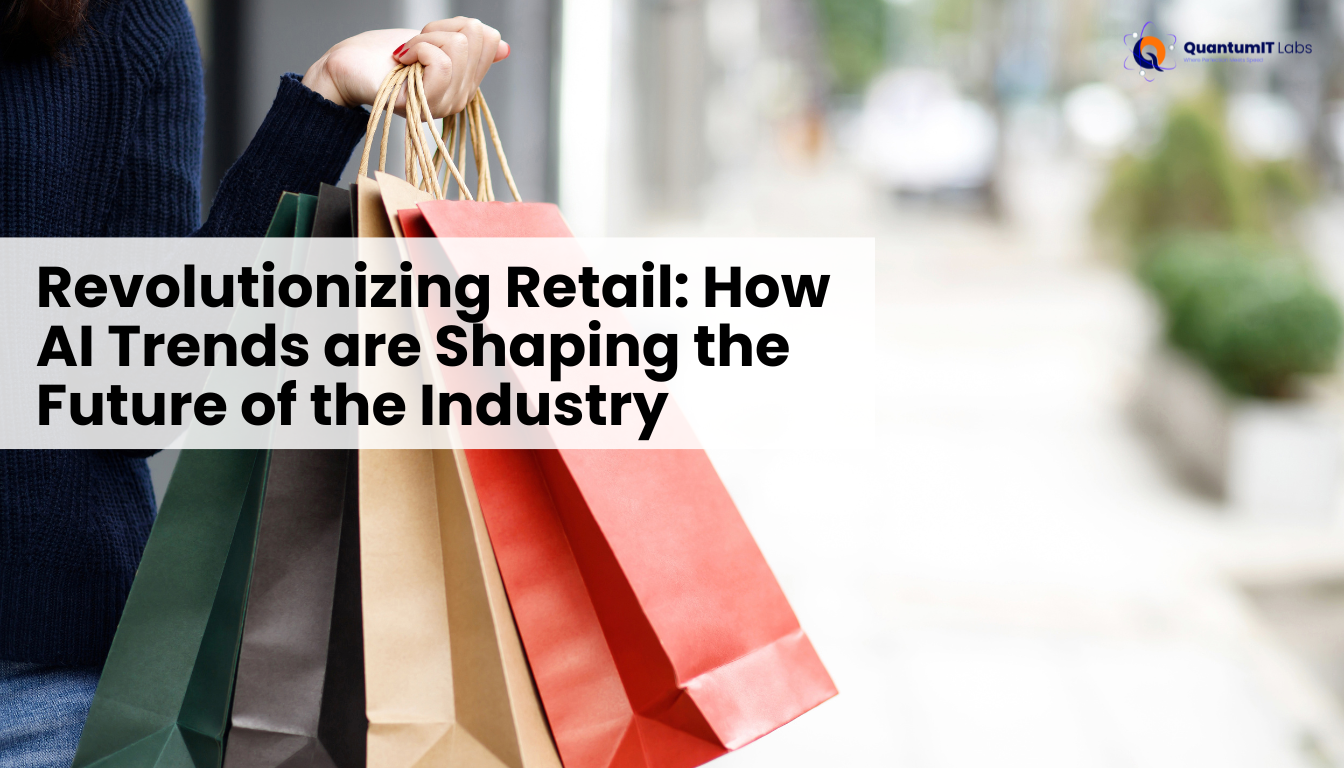Introduction
The retail industry is undergoing a major transformation, and Artificial Intelligence (AI) is at the heart of this revolution. From personalized shopping experiences to streamlined operations, AI technologies are enabling retailers to enhance customer satisfaction, optimize efficiency, and boost profitability. In this blog, we’ll explore the latest AI trends shaping the retail industry and how businesses are using them to stay ahead of the competition.
1. AI-Powered Customer Service: The Future of Support
In today’s fast-paced retail environment, providing exceptional customer service is key to retaining customers. AI-powered chatbots and virtual assistants are becoming an integral part of this experience. These systems can handle customer inquiries, recommend products, assist in purchasing decisions, and even offer post-purchase support—24/7. This not only enhances customer satisfaction but also reduces the workload on human staff, allowing them to focus on more complex tasks.
Benefits:
- Improved response times and customer satisfaction
- Reduced operational costs
- Availability around the clock
2. Personalization at Scale: Creating Tailored Shopping Experiences
AI is helping retailers take personalization to new heights. By analyzing vast amounts of customer data, including browsing habits, purchase history, and preferences, AI algorithms create highly tailored shopping experiences. Personalized product recommendations, targeted promotions, and dynamic pricing are just a few examples of how AI is enabling businesses to offer unique experiences to every shopper.
Benefits:
- Increased conversion rates
- Enhanced customer loyalty and retention
- Better customer engagement
3. Smarter Inventory Management and Demand Forecasting
One of the biggest challenges in retail is maintaining the right inventory levels. Too much stock leads to overstock and markdowns, while too little can cause stockouts and lost sales. AI can help retailers optimize inventory management by forecasting demand with high accuracy. AI systems analyze data from multiple sources such as sales trends, weather patterns, and seasonal events to predict which products will be in demand, helping businesses stock smarter and reduce waste.
Benefits:
- Improved stock management
- Reduced risk of overstocking or stockouts
- Optimized supply chain efficiency
4. Cashierless Stores: The Rise of Automated Checkout
Imagine walking into a store, grabbing your items, and leaving without having to go through a checkout process. Thanks to AI technologies like computer vision and sensor fusion, this futuristic shopping experience is already a reality. Automated checkout systems, powered by AI, allow customers to shop seamlessly without waiting in line, creating a more efficient and enjoyable shopping experience.
Benefits:
- Faster checkout and reduced wait times
- Enhanced customer experience
- Reduced labor costs
5. Voice-Activated Shopping: A Hands-Free Revolution
AI-powered voice assistants are changing the way customers interact with retailers. Whether it’s through smart speakers like Amazon Alexa or voice assistants on smartphones, customers can now shop hands-free by simply speaking their preferences. From placing orders to asking for product recommendations, voice-activated shopping makes the shopping experience more convenient and accessible.
Benefits:
- Convenient, hands-free shopping
- Increased accessibility for customers
- Personalized product recommendations
6. Fraud Detection and Prevention: Securing Transactions with AI
In the digital age, fraud prevention is critical. AI plays a significant role in enhancing security for both retailers and customers. By analyzing transaction patterns in real-time, AI systems can quickly detect suspicious activities and prevent fraudulent transactions. This not only helps protect businesses from financial loss but also builds trust with customers, knowing their personal data is secure.
Benefits:
- Real-time fraud detection
- Enhanced security for customers
- Reduced financial losses from fraudulent activities
7. Dynamic Pricing: Maximizing Profitability in Real-Time
AI is transforming pricing strategies in the retail industry. With dynamic pricing, AI can adjust the cost of products in real-time based on demand, competitor pricing, customer behavior, and other market conditions. This allows retailers to stay competitive while maximizing profitability by offering the right price at the right time.
Benefits:
- Maximized profitability
- Competitive edge in pricing
- Improved customer satisfaction with competitive pricing
8. AI in Marketing: Targeting the Right Customers
AI isn’t just helping retailers optimize their operations; it’s also transforming marketing strategies. By analyzing consumer data, AI helps retailers create hyper-targeted marketing campaigns. These campaigns can be personalized based on a customer’s preferences, browsing behavior, and purchase history. AI-driven marketing allows for more effective ad placements, improved customer segmentation, and better overall campaign performance.
Benefits:
- Increased ad performance and ROI
- Better customer segmentation
- More effective and personalized marketing campaigns
Conclusion
AI is no longer just a trend—it’s a game-changer for the retail industry. From enhancing customer experiences with personalized recommendations to streamlining operations through smarter inventory management, AI is reshaping how retailers engage with customers and run their businesses. As technology continues to evolve, it’s clear that AI will be at the forefront of innovation in the retail space, helping businesses stay competitive and meet the growing demands of the modern consumer.

